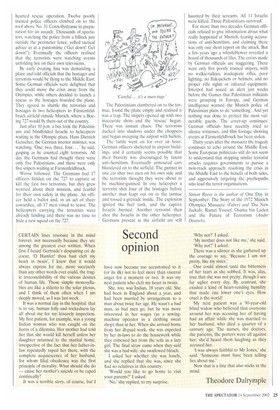Second opinion
CERTAIN lines resonate in the mind forever, not necessarily because they are among the greatest ever written. When first I heard Gertrude's despairing cri de coeur, '0 Hamlet! thou hast cleft my heart in twain', I knew that it would always express for me, more succinctly than any other words ever could, the tragic irreconcilability of the various desires of human life. Those simple monosyllables are like a stiletto to the solar plexus, and I think of them often when I am deeply moved, as I was last week.
It was a normal day in the hospital: that is to say, human folly and wickedness lay all about me for my leisurely inspection. My first patient, for example, was a young Indian woman who was caught on the horns of a dilemma. Her mother had told her that she would kill herself unless her daughter returned to the marital home, irrespective of the fact that her father-inlaw repeatedly raped her there, with the complete acquiescence of her husband, for whom filial obedience was the first principle of morality. What should she do — cause her mother's suicide or be raped continually?
It was a terrible story, of course, but I have now become too accustomed to it (or its ilk) not to feel more than visceral anger for a moment or two. It was my next patient who cleft my heart in twain.
She, too, was Indian, 18 years old. She had been in England about a year, and had been married by arrangement to a man about twice her age. He wasn't a bad man, as bad men go, but he was more interested in her wages (as a sewingmachine operator in a clothing sweat shop) than in her. When she arrived home from her ill-paid work, she was expected by her in-laws to do the housework while they criticised her from the sofa as a lazy girl. The final straw came when they said she was a bad wife: she swallowed bleach.
I asked her whether she was lonely, and she replied that she was, since she had no relatives in this country.
'Would you like to go home to visit your parents?' I asked.
'No,' she replied, to my surprise. 'Why not?' I asked.
'My mother does not like me,' she said. 'Why not?' I asked.
There was a silence as she gathered up the courage to say, 'Because I am not pretty, like my sister.'
One could almost taste the bitterness of her tears as she sobbed. It was, alas, true that she was not pretty, though I see far uglier every day. By contrast, she exuded a kind of heart-rending humility that made one lower one's eyes. How cruel is the world!
My next patient was a 90-year-old blind widow who believed that everyone around her was accusing her of having had an affair while she was married to her husband, who died a quarter of a century ago. The nurses, the doctors, the patients, the porters were all against her; she'd heard them laughing as they accused her.
'I was always faithful to Mr Jones,' she said. 'Someone must have been telling lies about me.'
Now that is a line that also sticks in the mind.
Theodore Dalrymple










































































 Previous page
Previous page